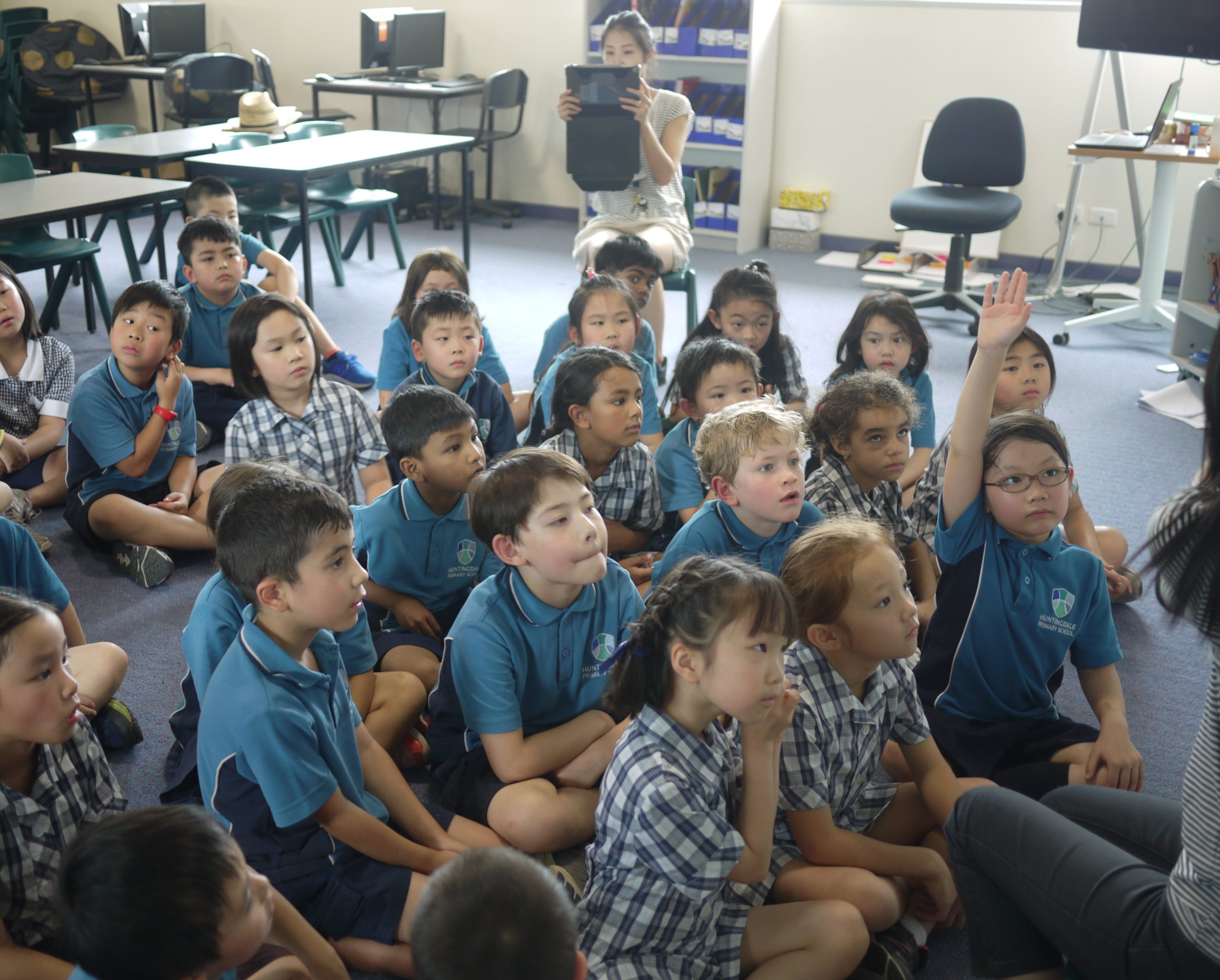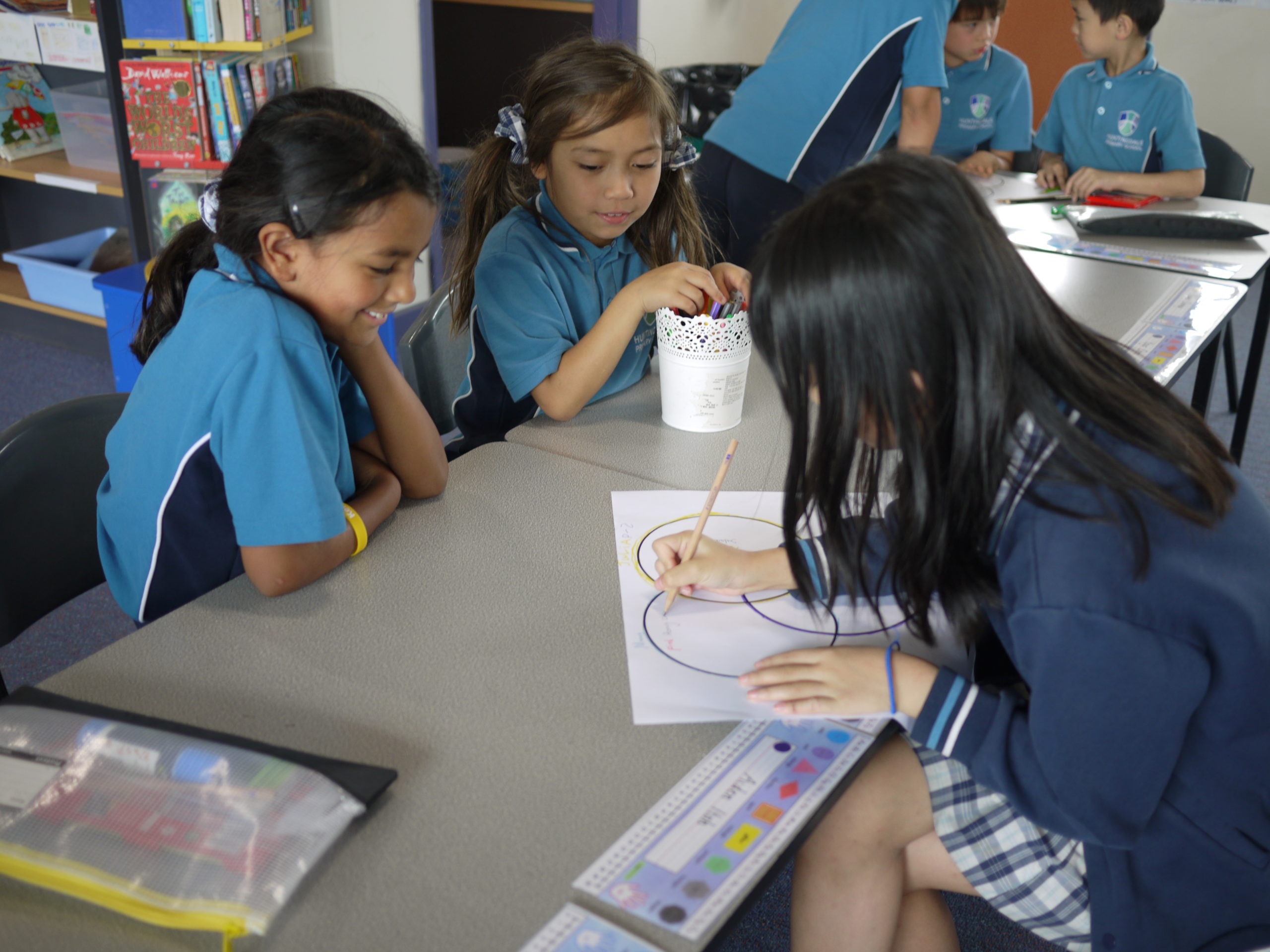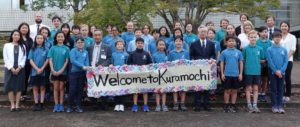Bilingual Education
Bilingual Education is the foundation upon which all teaching and learning at Huntingdale is placed. As you scroll through the information located in the website you will quickly realise that bilingualism is more than just knowing how to understand, speak, read and write in two languages.
VISION FOR BILINGUAL LEARNING
Our school has worked with other Bilingual Schools to create a vision for Bilingual Learning. Please see the documents below:
PROMOTING A BILINGUAL LEARNING ENVIRONMENT AT HUNTINGDALE PRIMARY SCHOOL
The school teaches a 50/50 curriculum model where students learn 50% of the curriculum in English and 50% in Japanese.
JAPANESE AND ENGLISH LITERACY (CLIL) APPROACH AT HUNTINGDALE PRIMARY SCHOOL
The school promotes bilingual collaboration between the English teacher and the Japanese teacher using CLIL – Content and Language Integrated Learning – approach to enhance the productive language of students.
Speaking in the Language You Know Best
We know that many of our students come to school knowing another language other than English or Japanese. Huntingdale Primary School and the Department of Education recognise that maintaining your child’s first language is important. Please see the following: https://www.vic.gov.au/speak-your-child-language-you-know-best
Professor Lo Bianco, who is Professor of Language and Literacy Education at the University of Melbourne Graduate School of Education, says parents often mistakenly believe speaking their first language to their children will hinder their ability to learn English – when in fact the opposite is true.
“It’s actually much better for children to have a rich knowledge base in their first language” he says. “If parents are learning English themselves and speaking to their children in English then they are talking to their children in a language they do not know very well”.
Benefits of Bilingual Education
Much has been written about the benefits of the bilingual brain. In particular, stimulating the sections of the brain which develop language competencies from an early age, has been shown to lead to other academic improvements. Researchers have shown that the bilingual brain can have better attention and task-switching abilities than the monolingual brain. To achieve a balance between the two languages, the brain relies on executive functions as the bilingual brain’s language systems are always active, deciding which language to receive the information in and which language to produce the response in, leading to receptive and productive language abilities. Bilingualism has been linked with improved metalinguistic awareness (the comparison of language systems), as well as with better memory, visual-spatial skills and even creativity. More and more of the world’s population is bilingual or multilingual rather than monolingual and we at Huntingdale have been promoting the benefits of being bilingual or multilingual to our families and further afield since 1997.
Further Information:
- Article: “The benefits of bilingual education in Australian schools”by Marianne Turner, Senior Lecturer at Monash University
- Fact Sheet: “Common Misconceptions about Learning Bilingually” by Dr. Ruth Fielding, Senior Lecturer at Monash University, in collaboration with Modern Language Teachers Association of Victoria
- Research: “Dual-Language Immersion Programs Raise Student Achievement in English” by Jennifer Steele et al.
- Position Paper: “Bilingual Advantage” by EduCluster Finland
- Innovation Showcase: “Spotlight 2020 – Bilingual Education” by HundrED
- TED Talk: “The Benefits of a Bilingual Brain” by Mia Nacamulli
Our Engaging Curriculum
Curriculum Design
The Victorian Curriculum, which all Victorian Government Schools teach,can be found at http://victoriancurriculum.vcaa.vic.edu.au
At Huntingdale we implement the Victoria curriculum through our highly successful:
- Literacy (English and Japanese) and Numeracy Programs
- Differentiated Curriculum
- Thinking Curriculum
- Integrated Technology
- Student Wellbeing Programs
- Extension and Enrichment Programs
- English as an Additional Language (EAL) Program
- Extensive Performing Arts and Sporting Programs
Our talented and dedicated teams of teachers are the strength behind the success of our curriculum planning and teaching. Each team meets weekly to ensure successful and consistent implementation of learning programs across year levels and progression across the school.

Differentiation
At Huntingdale we provide a differentiated curriculum based on Vygotsky’s understanding that children follow adults’ examples and gradually develop the ability to do certain tasks with help or assistance. He calls the difference between what a child can do with help and what he or she can do without guidance the “Zone of Proximal Development (ZPD)”. It is through the use of formative assessment tasks that teachers quickly ascertain children’s ZPD and work to develop their skills and knowledge to enable them to tackle the next stage of learning.
Differentiation places the students at the centre of teaching and learning. Each child comes to school with a different set of learning needs and varying degrees of academic skill development. Differentiation ensures teachers proactively plan a variety of instruction methods so as to best facilitate effective learning experiences which are suited to the various learning needs within the classroom.
At Huntingdale we work to develop a deep understanding of children’s levels of understanding with a particular focus on Literacy (English and Japanese) and Numeracy to inform teaching and learning sequences. As a staff we plan units of work which cater for children who are working across a range of levels to ensure that all students in our care are catered for within the classroom environment.
Thinking
The world is changing at an accelerating rate. Students of today require highly developed skills in order to become successful global citizens. The ability to think effectively in a variety of situations is essential for each student to succeed. At Huntingdale we teach our students different ways of thinking and learning. These are skills which can be transferred to everyday life and everyday situations as tools for lifelong learning.
An explicit focus on thinking and the teaching of thinking skills aims to develop students’ thinking repertoire. Students need to be supported to move beyond the lower-order cognitive skills of recall and comprehension to the higher-order processes required for creative problem solving, decision making and conceptualising. These ideas are supported at Huntingdale by developing a culture which values and promotes thinking and providing sufficient time to think, reflect and engage in sustained discussion, deliberation and inquiry. Students are provided with challenging and open-ended tasks which stimulate, encourage and support skillful and effective thinking.
Inquiry Teaching and Learning
To facilitate engaging learning across the curriculum, Inquiry learning and teaching at Huntingdale Primary School starts with students’ wonderings, interests and passion. While each year level explores a different “driving question” that guides students’ learning, the key concept for each term is consistent across the whole school – in both English and Japanese.
Students are exposed to the wide and rich curriculum areas addressed in the Victorian Curriculum throughout their Inquiry learning. The Learning areas and Capabilities addressed in the curriculum provides an authentic context for student learning. The extensive content, skills and dispositions, together with students’ background knowledge, passion and wonderings, are used to facilitate Inquiry learning at Huntingdale Primary School.
The aim of our Inquiry approach is to empower students with skills for lifelong learning: thinking, questioning, observing, synthesising, creating and reflecting.These skills are embedded in students’ learning through teacher-modelling and explicit teaching so that students can gradually guide their own learning.
Cultural and Extra Curricular Activities
“It takes a whole village to raise a child”
This well known African saying reflects the philosophy of the teachers at Huntingdale. We encourage and facilitate a wide range of community performance and artistic events to provide an added dimension to the learning experience provided at Huntingdale. Each semester, the students will be provided with excursions or in-school visits related to the key learning concept at their year level. In addition to these scheduled opportunities for expanding the children’s view of the world we also invite parents and local community members to enhance our Inquiry Program when they have a particular talent linked to the Term’s unit of work.
Japanese Bilingual Immersion Learning
Bilingual Education is the cornerstone of learning at Huntingdale Primary School. The school embarked on Bilingual Education in Term 3, 1997 and has grown over the years.
The success of our Bilingual education is grounded in research into best practice in language immersion:
- Immersion is the most natural way for young children to learn a second language
- In the Japanese classroom students are only spoken to in Japanese. They can ask questions in English but the response will always be in Japanese
- The Japanese speaking classroom teachers must have a native level of fluency and cross cultural understanding
- The two classroom teachers (English and Japanese speaking teachers) plan together so learning is supported in both languages
- Both languages (English and Japanese) and both cultures (Australian and Japanese) are valued and reflected in school performances and community events
Our Japanese Bilingual Model is called 50/50, meaning 50% of the curriculum is taught in English including Reading, Writing, Speaking & Listening, Visual Arts, Physical Education and Inquiry (Science / Humanities) and the other 50% of the curriculum in taught in Japanese including Reading, Writing, Speaking and Listening, Mathematics, Dance and Drama. Wellbeing is taught in both languages and assembly is presented bilingually in both languages.

Sister School Relationships
Senior students Japan Trip / Sister School
Traditionally, all Senior students are provided with the opportunity to travel to Japan. This is funded by parents. The school has a Sister School relationship with Kuramochi Primary School and this is a key location in our trip.
During the visit to Japan, the children stay at authentic accommodation where they are immersed in traditional Japanese culture. The students also spend time at Kuramochi Primary School, it is an extraordinary opportunity for our students.
Please click here to see the Memorandum of Understanding between the two schools: MOU Huntingdale Kuramochi

